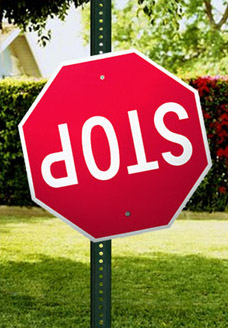Broken Stop Sign No Match for 9-person Streets Department Work Crew
Broken stop signs don’t just fix themselves. It takes a well-oiled machine firing on all cylinders to get the job done. You need the right tools, expert planning, unflagging dedication, and in the city of Philadelphia, at least 8 members of their Public Works Streets Department crew.
With a solid six hours scheduled for the repair work (and a few extra hours figured in for unforeseen problems), the Philadelphia Street Department deployed a team of nine hardhat-clad workers and three large city trucks to the tony suburb of Chestnut Hill where the malfunctioning street sign resided on a quiet side street at a four-way stop intersection. Crew chief Mack Colcannon assessed the situation after thoroughly scoping out the traffic hazard for three hours the day before.

“It looks bad. dangerous, to say the least,” said Colcannon as he sipped coffee and pointed to the sign. “When the top bolt falls out, the stop sign swings freely and ends up upside down pivoting on the bottom screw. This is not acceptable and must be fixed immediately, well, as soon as the paperwork passes through the bureau and gets approved, usually within 3 to 5 weeks.”
After a 30-minute game-plan meeting, the crew began working at 9:00 a.m. and placed traffic cones and large orange “Men Working” signs at both ends of the street, blocking the road and rerouting the morning traffic. “Safety first,” said Colcannon as he looked up from his Daily News sports section from the front seat of his truck.
Work progressed slowly but methodically with each worker — from the four flagmen directing the scant traffic away from the road to the three “spotters’ who made sure the “ladderman” was safe as he ascended the three rungs to reach the top of the sign — who made sure the job got done correctly with no mishaps.
“It’s physically tough, but rewarding work,” said spotter Bill Lambe. “And important! I mean would my boss, his two superiors, and the Streets Department Regional Director spend all morning standing around drinking coffee and watching us if this wasn’t an important job? I don’t think so.” Lambe excused himself as he and the rest of the crew boarded their trucks and headed to a Wawa for their union-mandated “morning break” (10:30 a.m.-10:50 a.m.).
After a solid and successful early afternoon of attacking the problematic sign head on, and getting it back in its upright position, the team encountered a roadblock. Even with lots of planning and skill, some jobs pose unique and unexpected challenges that can delay a timely completion.
“We brought the wrong bolt,” said Colcannon as he hopped in his truck and left to get the correct replacement after a quick team meeting.
Work may have halted for an hour or so, but the team took the time to rest up and re-energize (some napped under a large elm tree while others took refuge in the cab of their trucks) to prepare for the final leg of work.
Many workers are content to put in their 37.5 hours a week and collect a check. Many more would stop right at 4:35 p.m. (the official end of day for these union workers) and leave their work until the next day. Not this plucky bunch.
With the sign half fixed at the closing bell, these dedicated professionals stayed the extra two hours to finish the job and put in the necessary overtime to get the job done right. The overtime pay of twice their regular hourly rate was scant compensation for delaying their happy hour stop at Towey’s Tavern, and thus pushing back even further their return to wives, children, and homes.
New screw secured. Sign fixed. Job well done.
Jeff Lyons
Suburban Beat Reporter


